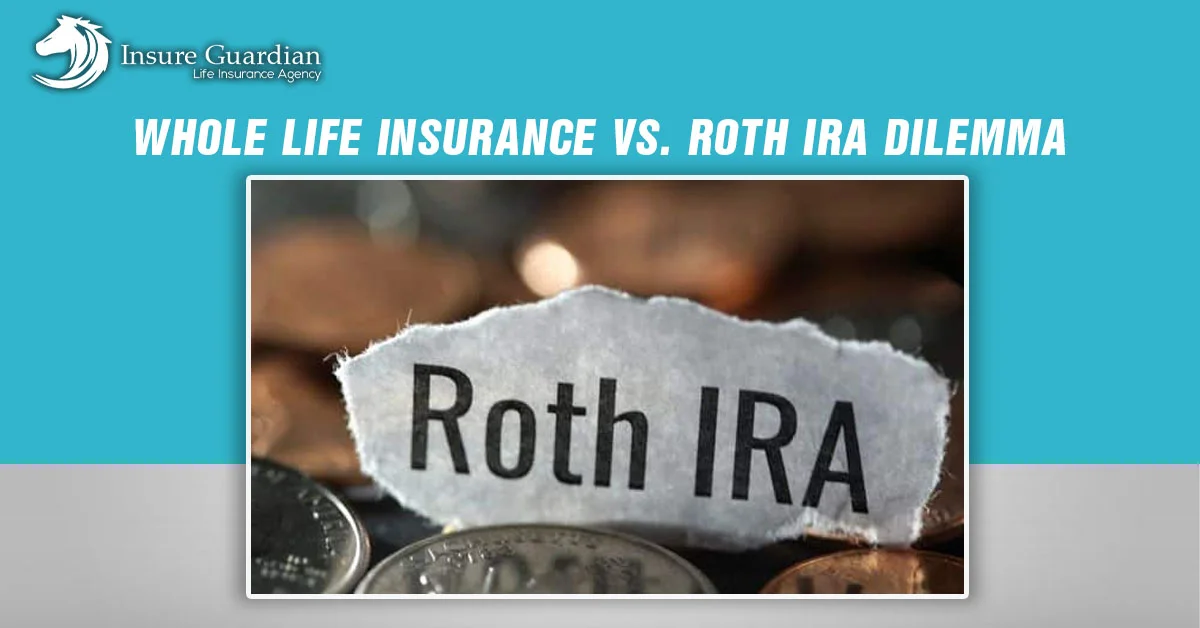The debate between whole life insurance and Roth IRAs has existed for years. There is no one clear winner because each has advantages and problems of its own. It depends on your specific situation.
Take notice of some factors before choosing:
- Whole life insurance has a tax-free death benefit.
- Whole life insurance has a cash value you can borrow against if needed.
- Roth IRAs have the potential to grow tax-free over time.
- Roth IRAs can be used for things other than retirement, such as education expenses.
- Whole life insurance typically has higher premiums than Roth IRAs.
- Whole life insurance is not portable like a Roth IRA.
- Whole life insurance has surrender charges if you cancel your policy early.
- Roth IRAs have contribution limits each year.
- Whole life insurance policies can be complex and confusing.
- You can name beneficiaries for your whole life insurance policy.
Ultimately, the decision of whether to purchase whole life insurance or open a Roth IRA is a personal one. There is no right or wrong answer. It depends on your circumstances’ uniqueness and your financial goals.
How Much Does Life Isurance Cost?
The Advantages and Disadvantages of Whole Life and Roth IRA
Choosing the best retirement account for you can be a challenge among many options for investors. Roth IRAs and whole life insurance are two standard options. So, which is preferable—a Roth IRA or full life insurance?
Your situation’s particulars and objectives can determine the answer to this question. Both Roth IRAs and whole life insurance have advantages and disadvantages of their own. In the end, the retirement account that best fulfills your needs will be your best option.
To help you choose the best option, we’ll examine the advantages and disadvantages of whole life insurance and Roth IRAs in greater detail here.
Whole life insurance Pros:
- If you pass away, the death benefit from whole life insurance might provide financial support for your loved ones.
- Over time, whole life insurance can accrue monetary value. This cash value can be obtained through policy loans or withdrawals and help to cater to various purposes, such as boosting retirement income or covering unforeseen costs.
- If you keep paying the payments, whole life insurance policies are guaranteed never to expire.
- You can reduce the amount of taxes taxes with whole life insurance. Your policy’s death benefit usually is tax-free, and its cash value increases tax-deferred.
- You can use whole life insurance as security for loans.
Whole life insurance Cons:
- whole life insurance is more expensive than other life insurance policies.
- There are surrender fees if you terminate your whole life insurance policy before the maturity date.
- If you have health difficulties, the premiums for whole life insurance policies could be higher.
- It could be challenging to comprehend all of the features and advantages of whole life insurance due to its complexity.
- Not everyone needs whole life insurance. Having different types of life insurance or retirement savings may benefit some people.
Roth IRA Pros:
- Contributions are made with after
- Tax dollars so investments are tax-free
- Withdrawals are tax-free if made after retirement age
- Asset growth is tax-free
- Investing is flexible, and funds are easily accessible
Roth IRA Cons:
- Individuals with higher incomes may not be eligible
- Contributions have an annual limit
- Withdrawals are not allowed until after retirement age
- Early withdrawals can result in hefty penalty fees.
Which is the Better Choice for You?
Whenever you think of financial planning, there are numerous options accessible, making it difficult to choose the one that is ideal for you. Roth IRAs and whole life insurance are two well-liked alternatives. What could be better for you, then?
Both Roth IRAs and whole life insurance offer particular positives and negatives; the best option for you will ultimately result from your financial circumstances. To pick the most outstanding choice for your purposes, consider a few essential variables.
Your present financial status and ambitions are among the main factors to be considered. If your current tax rate is high, a Roth IRA might be better for you since it provides for tax-free growth. However, if you are at a lower tax rate, the tax-deferred growth of a whole life insurance policy can be more advantageous.
Your age is another critical consideration. Younger people may have more time to benefit from a Roth IRA’s potential for tax-free growth. However, the death benefit of a whole life insurance policy may be more advantageous if you are older or nearing retirement.
Last but not least, remember your long-term financial goals. A Roth IRA may be a better choice if your primary goal is to save for retirement. However, if you’re more concerned with leaving a financial legacy or ensuring that your family will be taken care of in the event of your dying, whole life insurance can be a better option.
Comparing whole life insurance and a Roth IRA might be challenging, but it’s crucial to thoroughly consider your options and choose the one that will work best for you and your family.





